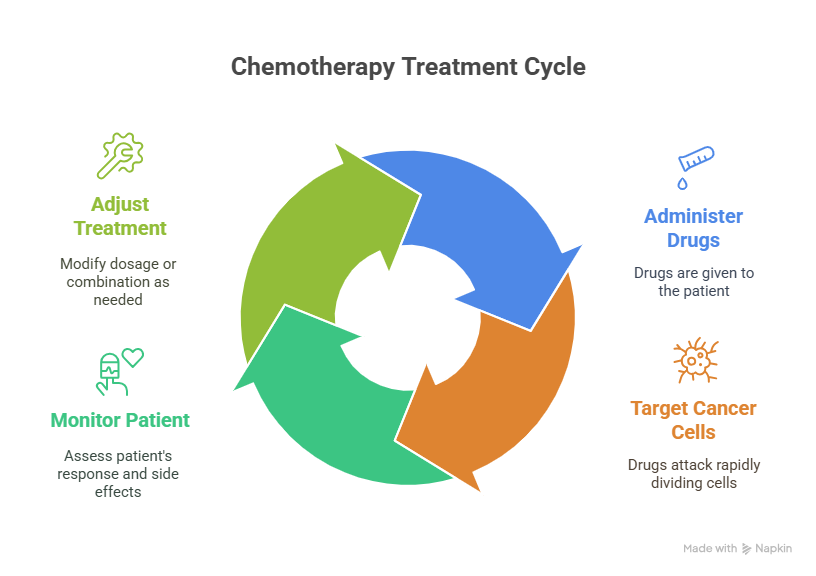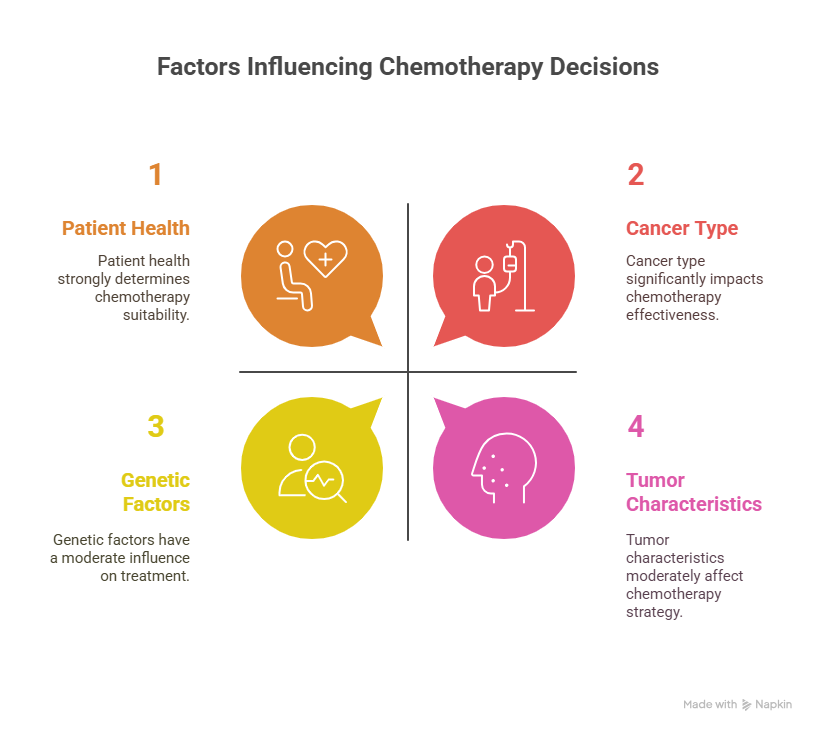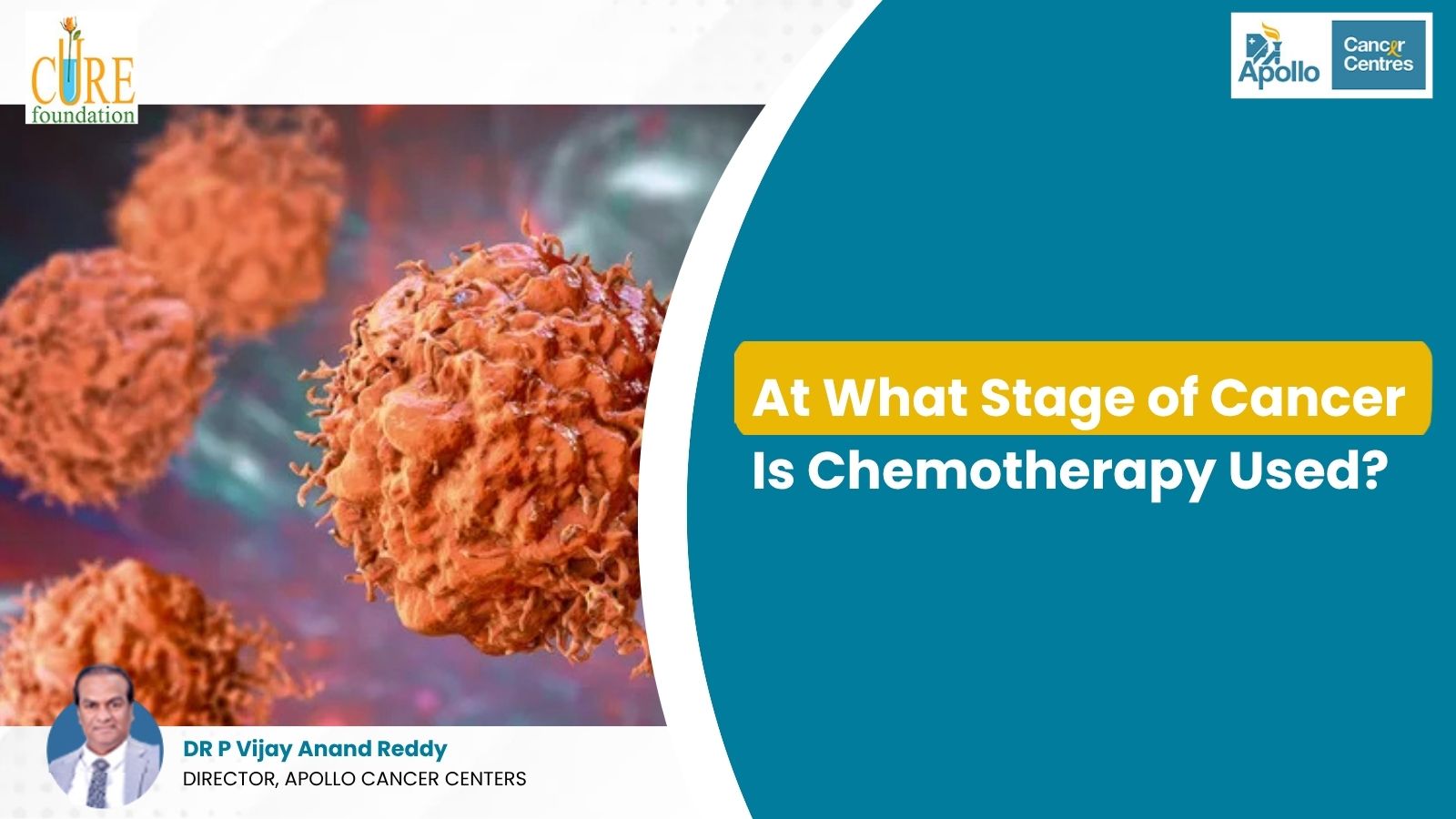Chemotherapy is one of the most commonly used cancer treatments. It is known for its ability to target and kill cancer cells, but a common question among patients is: At what stage of cancer is chemotherapy used? The answer to this question is not one-size-fits-all. Chemotherapy can be used at various stages of cancer treatment, depending on the type of cancer, its stage, and the patient’s overall health. In this blog, we will explore the role of chemotherapy at different stages of cancer, the factors that influence when it’s used, and how it fits into the broader treatment plan, with expert insights from Dr. Vijay Anand Reddy, one of the Best Oncologists in India.
What is Chemotherapy?
Chemotherapy involves the use of drugs that target rapidly dividing cells, such as cancer cells. These drugs can be administered through various routes, including intravenously or orally, and are designed to destroy cancer cells or stop them from growing. Chemotherapy can be used alone or in combination with other cancer treatments like surgery, radiation therapy, or immunotherapy.
However, at what stage of cancer is chemotherapy used? The timing, dosage, and combination of chemotherapy depend largely on the cancer type, the patient’s medical condition, and treatment goals.

Stages of Cancer: What Does It Mean for Chemotherapy?
Cancer stages range from early (Stage 1) to advanced (Stage 4), with Stage 1 indicating localized cancer and Stage 4 representing metastasis, where the cancer has spread to other parts of the body. At what stage of cancer chemotherapy is used depends on these factors, and chemotherapy can be used at any stage of cancer treatment, based on specific needs and goals.
1. Stage 1 Cancer: Early Stage Treatment
In Stage 1 cancer, the tumor is usually localized, meaning it has not spread to nearby lymph nodes or distant organs. In many cases, surgery is the primary treatment for Stage 1 cancer. However, chemotherapy may still be used in some situations, especially if the cancer type is aggressive or if the patient is at a higher risk of recurrence.
At what stage of cancer is chemotherapy used in the early stages? Chemotherapy can be used in Stage 1 cancer under the following circumstances:
- Adjuvant Chemotherapy: This is chemotherapy given after surgery to eliminate any remaining cancer cells that may not have been visible during the surgery. This reduces the risk of recurrence.
- Neoadjuvant Chemotherapy: In some cases, chemotherapy may be used before surgery to shrink the tumor, making it easier to remove surgically.
For certain types of cancer, such as breast cancer or colon cancer, chemotherapy may be recommended as part of a Stage 1 treatment plan to ensure that all potential cancer cells are destroyed.
2. Stage 2 Cancer: Early Spread, More Aggressive Treatment
Stage 2 cancer indicates that the tumor has grown larger and may have spread to nearby lymph nodes, but it hasn’t spread to distant organs yet. At this stage, chemotherapy plays a more prominent role in treatment to ensure that any potential metastases (spread of cancer) are controlled.
At what stage of cancer is chemotherapy used in Stage 2?
- Adjuvant Chemotherapy: After surgery, chemotherapy is often recommended to treat any microscopic cancer cells that could lead to a recurrence.
- Neoadjuvant Chemotherapy: In some cases, chemotherapy may be used to shrink the tumor before surgery, making the tumor more manageable for removal.
Chemotherapy for Stage 2 cancer can increase the chances of a complete cure, especially if the cancer is aggressive or if the tumor is large and difficult to remove.
3. Stage 3 Cancer: Advanced Cancer, Aggressive Treatment
Stage 3 cancer is considered an advanced stage where the cancer has spread to nearby tissues, organs, or lymph nodes but hasn’t yet spread to distant parts of the body. Chemotherapy becomes more important at this stage because it can help shrink the tumor and reduce the extent of cancer spread.
At what stage of cancer is chemotherapy used for Stage 3? In this stage, chemotherapy is typically used in several ways:
- Neoadjuvant Chemotherapy: This is chemotherapy given before surgery to shrink large tumors or cancer that has spread to surrounding areas. This makes the surgery more successful.
- Adjuvant Chemotherapy: After surgery, chemotherapy is often used to destroy any remaining cancer cells, decreasing the risk of the cancer coming back.
- Palliative Chemotherapy: In some cases, when the cancer is not operable or the patient is not a good candidate for surgery, chemotherapy is used to control the growth of cancer and manage symptoms.
At this stage, Dr. Vijay Anand Reddy, one of the Best Oncologists in India, carefully tailors chemotherapy regimens to ensure the most effective treatment plan for patients, considering the cancer’s response to initial treatments and the patient’s overall health.
4. Stage 4 Cancer: Metastatic Cancer Treatment
Stage 4 cancer is the most advanced stage, where the cancer has spread to distant organs or tissues. At this stage, chemotherapy is often used to control the cancer rather than cure it. At what stage of cancer is chemotherapy used for Stage 4? Here, chemotherapy can be employed to:
- Shrink the Tumors: While chemotherapy may not cure Stage 4 cancer, it can help shrink tumors and alleviate symptoms.
- Control Disease Progression: Chemotherapy can slow the growth of cancer, improving the patient’s quality of life and extending survival.
- Palliative Chemotherapy: For Stage 4 cancer, chemotherapy may be used to ease symptoms such as pain, nausea, and fatigue, helping patients maintain a better quality of life.
In many cases of Stage 4 cancer, chemotherapy is used in combination with other treatments, such as targeted therapy, immunotherapy, or radiation, to manage the disease.
Factors Influencing Chemotherapy Decisions
While the stage of cancer chemotherapy is a critical factor, other considerations also influence the decision to begin chemotherapy:
- Cancer Type: Different types of cancer respond to chemotherapy differently. Some cancers, such as leukemia and lymphoma, are more responsive to chemotherapy, while others may require additional therapies.
- Tumor Characteristics: The location, size, and growth rate of the tumor can affect how chemotherapy is used. Some tumors are more sensitive to chemotherapy, while others are more resistant.
- Patient Health: A patient’s age, overall health, and ability to tolerate chemotherapy play a major role in determining whether chemotherapy is appropriate. Patients with underlying health conditions may need a modified or less aggressive chemotherapy regimen.
- Genetic Factors: Advances in molecular biology have allowed for more personalized cancer treatments. Genetic testing can determine whether a patient’s cancer is likely to respond to chemotherapy or if other treatments are more effective.
Dr. Vijay Anand Reddy, known for his personalized care as one of the Best Oncologists in India, utilizes genetic testing and advanced diagnostic tools to craft treatment plans specific to each patient’s unique needs.

Chemotherapy Side Effects and Management
Chemotherapy, while effective, can cause side effects such as fatigue, nausea, hair loss, and weakened immunity. These side effects can vary depending on the type and dose of chemotherapy drugs. However, many side effects can be managed with medications and supportive care.
Dr. Vijay Anand Reddy and his team at the clinic provide patients with comprehensive support to manage these side effects, ensuring that chemotherapy is as effective and comfortable as possible for the patient.
Conclusion: At What Stage of Cancer Is Chemotherapy Used?
Chemotherapy is an essential treatment for many types of cancer, and at what stage of cancer is chemotherapy used? depends on the type and stage of the disease. It can be used at various stages, from early-stage cancers to metastatic disease, to either cure the cancer, prevent its spread, or control symptoms.
Whether chemotherapy is used as a neoadjuvant, adjuvant, or palliative treatment, its goal is always to improve the patient’s chances of recovery or extend their quality of life. For Dr. Vijay Anand Reddy, one of the Best Oncologists in India, chemotherapy is a key part of the treatment plan, tailored to meet the specific needs of each patient.
Frequently Asked Questions
Can I live a normal life during chemo?
Many patients can maintain a relatively normal life during chemotherapy, though energy levels and daily routines may need adjustment. Most people continue working (often with modified schedules), maintain social relationships, and pursue light activities. The key is listening to your body, planning around treatment days, and making accommodations for fatigue and side effects while staying as active as possible.
How painful is chemotherapy?
Chemotherapy itself is typically not painful – it’s administered through IV infusion or oral medications. However, side effects like mouth sores, neuropathy (nerve pain), bone pain, or injection site discomfort can cause pain. Most chemotherapy-related pain is manageable with medications, and pain levels vary significantly between individuals and treatment types.
Is 12 cycles of chemo a lot?
Twelve cycles is considered a standard to moderately intensive chemotherapy regimen, depending on the cancer type and treatment protocol. Some patients receive 4-6 cycles, while others may need 16-24 cycles. The number of cycles is carefully determined based on cancer stage, response to treatment, and individual tolerance, with oncologists balancing effectiveness against side effects.
Does chemo age you?
Chemotherapy can cause temporary aging effects like hair thinning, skin changes, fatigue, and cognitive effects (“chemo brain”), but many of these are reversible after treatment ends. Some patients may experience long-term effects like early menopause or increased risk of certain health conditions, but the life-saving benefits typically far outweigh these concerns.
What is the success rate of chemotherapy?
Chemotherapy success rates vary widely depending on cancer type, stage, and individual factors, ranging from 30-95%. For some cancers like testicular cancer or certain lymphomas, cure rates exceed 90%, while for others, chemotherapy may extend life and improve quality rather than cure. Your oncologist can provide specific statistics based on your particular diagnosis and treatment plan.

